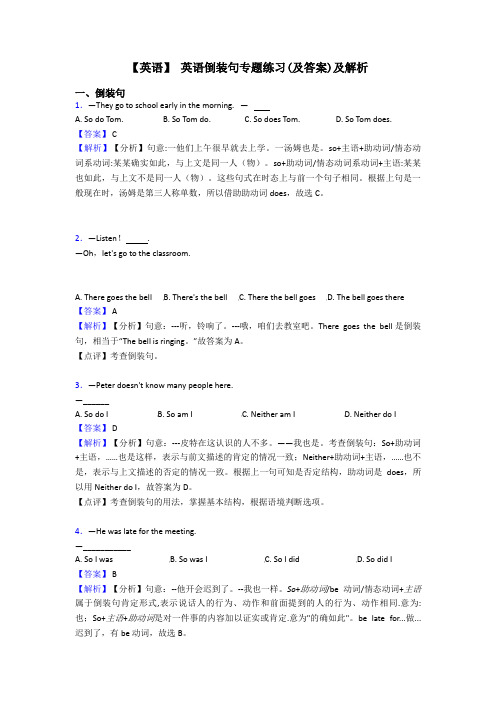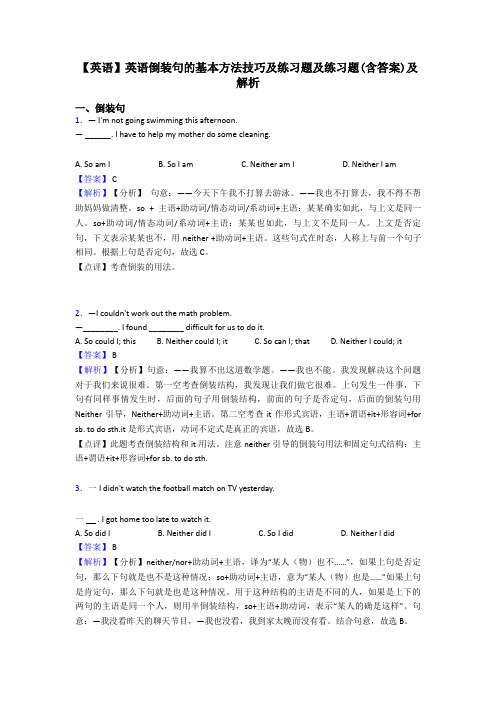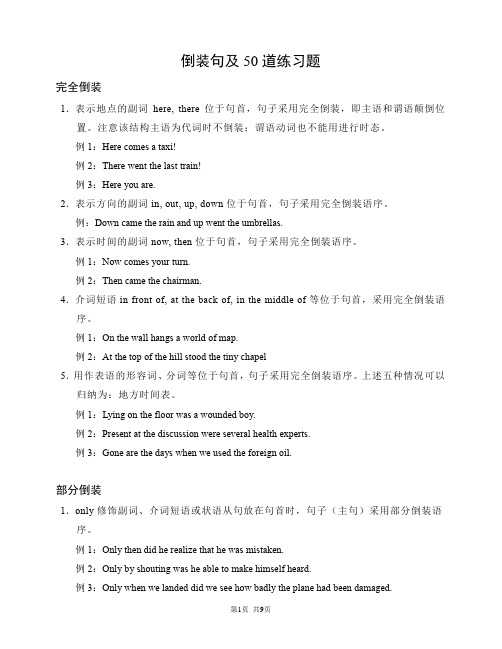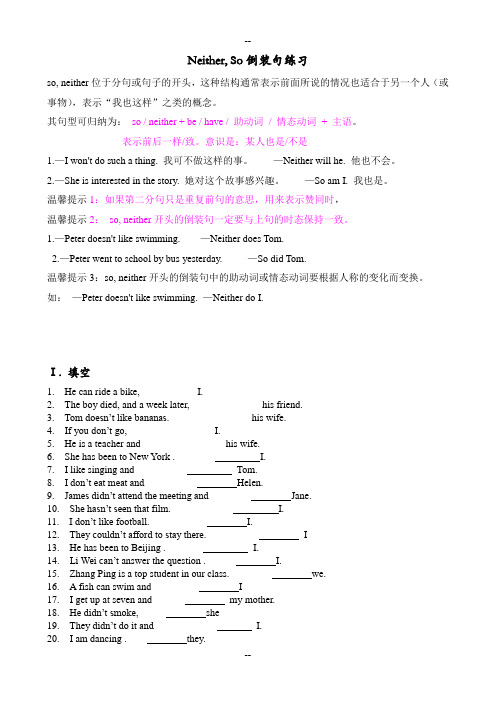倒装句改写及练习1
英语倒装句练习题

英语倒装句练习题倒装句是英语语法中的一种特殊结构,它在句子中将主语与谓语的词序颠倒。
倒装句的使用能够提升句子的表达力和语言的灵活性。
在本文中,我将为大家提供一些关于倒装句的练习题,以帮助大家更好地理解和掌握倒装句的用法。
1. Only when the rain stops ________.答案:will we go out解析:只有当雨停了,我们才会出去。
在这个句子中,由于only引导的是状语从句,因此需要进行倒装。
2. Not until I finished my homework ________.答案:did I go out解析:直到我完成作业后,我才出去。
在这个句子中,由于not until引导的是状语从句,因此需要进行倒装。
3. Here ________.答案:comes the bus解析:车来了。
在这个句子中,由于here引导的是一个地点状语,因此需要进行倒装。
4. In no way ________.答案:can I accept your proposal解析:我无论如何都不能接受你的建议。
在这个句子中,由于in no way引导的是一个否定状语,因此需要进行倒装。
5. Little did I know ________.答案:what the future held解析:我毫不知道未来会发生什么。
在这个句子中,由于little引导的是一个状语从句,因此需要进行倒装。
6. Under no circumstances ________.答案:should you give up解析:在任何情况下都不应该放弃。
在这个句子中,由于under no circumstances引导的是一个否定状语,因此需要进行倒装。
7. Rarely ________.答案:have I seen such a beautiful sunset解析:我很少见到如此美丽的日落。
在这个句子中,由于rarely引导的是一个状语,因此需要进行倒装。
【英语】 英语倒装句专题练习(及答案)及解析

【英语】英语倒装句专题练习(及答案)及解析一、倒装句1.—They go to school early in the morning. —A. So do Tom.B. So Tom do.C. So does Tom.D. So Tom does.【答案】 C【解析】【分析】句意:一他们上午很早就去上学。
一汤姆也是。
so+主语+助动词/情态动词系动词:某某确实如此,与上文是同一人(物)。
so+助动词/情态动词系动词+主语:某某也如此,与上文不是同一人(物)。
这些句式在时态上与前一个句子相同。
根据上句是一般现在时,汤姆是第三人称单数,所以借助助动词does,故选C。
2.—Listen! .—Oh,let's go to the classroom.A. There goes the bellB. There's the bellC. There the bell goesD. The bell goes there 【答案】 A【解析】【分析】句意:---听,铃响了。
---哦,咱们去教室吧。
There goes the bell是倒装句,相当于“The bell is ringing。
”故答案为A。
【点评】考查倒装句。
3.—Peter doesn't know many people here.—______A. So do IB. So am IC. Neither am ID. Neither do I【答案】 D【解析】【分析】句意:---皮特在这认识的人不多。
——我也是。
考查倒装句:So+助动词+主语,……也是这样,表示与前文描述的肯定的情况一致;Neither+助动词+主语,……也不是,表示与上文描述的否定的情况一致。
根据上一句可知是否定结构,助动词是does,所以用Neither do I,故答案为D。
【点评】考查倒装句的用法,掌握基本结构,根据语境判断选项。
倒装句总结和练习

倒装句总结和练习一、倒装句1.——Lucy can't go mountain climbing with us tomorrow.——_________ I have to do housework at home.A. So can I.B. Neither can I.C. Neither I can.【答案】 B【解析】【分析】句意:——明天露西不能和我们一起去爬山。
——我也不能去。
我不得不在家里做作业。
So+助动词/情态动词/系动词+主语:某某也如此,与上文不是同一人。
上文是否定句,下文表示某某也不,用neither +助动词/情态动词/系动词+主语。
这些句式在时态上与前一个句子相同。
根据上句用情态动词can,是否定句,结合句意,故选B。
2.—Zhou Ming likes reading English magazines.—_______. It's good for English learning.A. So do IB. So am IC. So I do【答案】 A【解析】【分析】句意为:—周明喜欢读英语杂志。
—我也是。
这对英语学习由好处。
So+助动词+主语,完全倒装,表示“.......也......”。
故选A。
【点评】考查倒装句3.—I didn't go to the cinema yesterday. What about you?—____________, because I was preparing for the project all the time.A. Nor do IB. Neither did IC. Neither am ID. Nor was I【答案】 B【解析】【分析】句意:—我昨天没有去电影院,你的?—我也没去,因为我一直在准备这个项目。
根据句意及题干分析此题是过去也没去,所以选B。
4.— I have changed my job.— __________________.A. So do IB. So have IC. So I doD. So I have【答案】 B【解析】【分析】句意:——我已经换了工作。
倒装句练习题及答案

倒装句练习题及答案一、改错练习(将下列错句改正为倒装句)1. Yesterday I met him in the park.答案:Yesterday met I him in the park.2. She never eats dessert after dinner.答案:Never does she eat dessert after dinner.3. They will go on a trip next week.答案:Next week will they go on a trip.4. I have never seen such a beautiful sunset before.答案:Never have I seen such a beautiful sunset before. 5. The cat always sits on the windowsill in the morning.答案:On the windowsill always sits the cat in the morning.二、选择练习(选择适当的倒装句填入空白处)1. ______ come the bus.A. HereB. Here comesC. Here does答案:B. Here comes2. _______ the phone he picked up.A. Up picked heB. He picked upC. Up he picked答案:A. Up picked he3. _______ on the door someone is knocking.A. On the door is knocking someoneB. On the door knocking someone isC. On the door is someone knocking答案:C. On the door is someone knocking4. Hardly ________ when it started raining heavily.A. it had started raining heavilyB. had it started raining heavilyC. did it started raining heavily答案:B. had it started raining heavily5. Not only ______ to the zoo, but she also saw a giraffe for the first time.A. did she goB. she did goC. she went答案:A. did she go三、完形填空(选择适当的倒装句填入空白处)Last night, as I was walking home 1 the park, I 2 a strange noise. It sounded like someone 3 behind a bush. I 4 to see what it was and 5 there was a small cat stuck in a tree. It was crying loudly 6 it couldn't get down."Calm down, little cat," I said. 7 down the tree I went and 8 out my phone to call for help. Just 9 I was about to make the call, a young girl appeared and said, "I can help! 10 I might be small, I'm very good at climbing trees."Without hesitation, the girl climbed the tree at an incredible speed. She reached the cat in no time 11 gently brought it down to the ground. I thanked her 12 and asked her where she lived."Not far from here," she replied.Slowly it dawned on me that the way she had come out of nowhere and climbed the tree so 13 was very unusual. I asked her name."Rachel," she said with a 14 on her face.At that moment, a strange feeling came over me. Could it be that Rachel was my guardian angel? 15 else could explain her sudden appearance and her amazing tree-climbing skills.Just as quickly as she had arrived, Rachel disappeared back into the park.I stood there 16 for a while, grateful for her help and in awe of what had justhappened. From that day on, I often 17 at that tree when I walked by, hoping to see Rachel again, but she never showed up.Sometimes in life, we encounter 18 people who come into our lives at the right moment and bring us unexpected joy. Whether they are human or perhaps something more, these special individuals remind us that miracles can happen and that we are never truly alone in this 19 world.So if you ever find yourself in need of help, keep your eyes open and your heart ready. You never know when your own guardian angel might 20.答案:1. A. through2. B. heard3. C. hiding4. B. decided5. A. sure enough6. C. as7. B. Climbing8. A. took9. B. before10. C. Though11. A. and12. C. again13. B. quickly14. A. smile15. C. What16. A. astonished17. C. glance18. B. remarkable19. A. vast20. B. appear写作指导:在练习题中,我按照题目的格式要求,使用了完形填空的格式来呈现文章。
倒装句练习题及答案

倒装句练习题及答案倒装句练习题及答案倒装句是英语语法中的一种特殊句型,它与一般句型的语序相反。
在倒装句中,通常将助动词、情态动词或谓语动词的全部或部分提前,以达到强调或修辞的目的。
倒装句在英语中的使用频率较高,因此熟练掌握倒装句的用法对于提高英语表达的准确性和流利性非常重要。
下面将提供一些倒装句的练习题及答案,帮助读者更好地理解和掌握倒装句的用法。
练习题一:将下列句子改写为倒装句。
1. She is always late for class.2. I have never seen such a beautiful sunset.3. They should have studied harder for the exam.4. The children are playing happily in the park.5. He can't speak French fluently.答案一:1. Always late for class is she.2. Never have I seen such a beautiful sunset.3. Harder should they have studied for the exam.4. Happily are the children playing in the park.5. Fluently can't he speak French.练习题二:将下列句子改写为倒装句。
1. He rarely goes to parties.2. They were watching a movie at the cinema.3. She has never been to Europe before.4. We should have listened to his advice.5. The bus will arrive at the station in ten minutes.答案二:1. Rarely does he go to parties.2. At the cinema were they watching a movie.3. Never has she been to Europe before.4. Listened to his advice should we have.5. In ten minutes will the bus arrive at the station.练习题三:将下列句子改写为倒装句。
【英语】英语倒装句的基本方法技巧及练习题及练习题(含答案)及解析

【英语】英语倒装句的基本方法技巧及练习题及练习题(含答案)及解析一、倒装句1.— I'm not going swimming this afternoon.— ______. I have to help my mother do some cleaning.A. So am IB. So I amC. Neither am ID. Neither I am【答案】 C【解析】【分析】句意:——今天下午我不打算去游泳。
——我也不打算去,我不得不帮助妈妈做清整。
so + 主语+助动词/情态动词/系动词+主语:某某确实如此,与上文是同一人。
so+助动词/情态动词/系动词+主语:某某也如此,与上文不是同一人。
上文是否定句,下文表示某某也不,用 neither +助动词+主语。
这些句式在时态,人称上与前一个句子相同。
根据上句是否定句,故选C。
【点评】考查倒装的用法。
2.—I couldn't work out the math problem.—________. I found ________ difficult for us to do it.A. So could I; thisB. Neither could I; itC. So can I; thatD. Neither I could; it【答案】 B【解析】【分析】句意:——我算不出这道数学题。
——我也不能。
我发现解决这个问题对于我们来说很难。
第一空考查倒装结构,我发现让我们做它很难。
上句发生一件事,下句有同样事情发生时,后面的句子用倒装结构,前面的句子是否定句,后面的倒装句用Neither引导,Neither+助动词+主语。
第二空考查it作形式宾语,主语+谓语+it+形容词+for sb. to do sth.it是形式宾语,动词不定式是真正的宾语,故选B。
【点评】此题考查倒装结构和it用法。
注意neither引导的倒装句用法和固定句式结构:主语+谓语+it+形容词+for sb. to do sth.3.一 I didn't watch the football match on TV yesterday.一 . I got home too late to watch it.A. So did IB. Neither did IC. So I didD. Neither I did【答案】 B【解析】【分析】neither/nor+助动词+主语,译为“某人(物)也不……”,如果上句是否定句,那么下句就是也不是这种情况;so+助动词+主语,意为“某人(物)也是……”如果上句是肯定句,那么下句就是也是这种情况。
倒装句及50道练习题(含答案)

倒装句及50道练习题完全倒装1.表示地点的副词here, there位于句首,句子采用完全倒装,即主语和谓语颠倒位置。
注意该结构主语为代词时不倒装;谓语动词也不能用进行时态。
例1:Here comes a taxi!例2:There went the last train!例3:Here you are.2.表示方向的副词in, out, up, down位于句首,句子采用完全倒装语序。
例:Down came the rain and up went the umbrellas.3.表示时间的副词now, then位于句首,句子采用完全倒装语序。
例1:Now comes your turn.例2:Then came the chairman.4.介词短语in front of, at the back of, in the middle of等位于句首,采用完全倒装语序。
例1:On the wall hangs a world of map.例2:At the top of the hill stood the tiny chapel5.用作表语的形容词、分词等位于句首,句子采用完全倒装语序。
上述五种情况可以归纳为:地方时间表。
例1:Lying on the floor was a wounded boy.例2:Present at the discussion were several health experts.例3:Gone are the days when we used the foreign oil.部分倒装1.only修饰副词、介词短语或状语从句放在句首时,句子(主句)采用部分倒装语序。
例1:Only then did he realize that he was mistaken.例2:Only by shouting was he able to make himself heard.例3:Only when we landed did we see how badly the plane had been damaged.2.so/such….that…句型位于句首时,主句部分采用倒装语序。
Neither和so倒装句练习题练习(1)

Neither, So倒装句练习so, neither位于分句或句子的开头,这种结构通常表示前面所说的情况也适合于另一个人(或事物),表示“我也这样”之类的概念。
其句型可归纳为:so / neither + be / have / 助动词/ 情态动词+ 主语。
表示前后一样/致。
意识是:某人也是/不是1.—I won't do such a thing. 我可不做这样的事。
—Neither will he. 他也不会。
2.—She is interested in the story. 她对这个故事感兴趣。
—So am I. 我也是。
温馨提示1:如果第二分句只是重复前句的意思,用来表示赞同时,温馨提示2:so, neither开头的倒装句一定要与上句的时态保持一致。
1.—Peter doesn't like swimming. —Neither does Tom.2.—Peter went to school by bus yesterday. —So did Tom.温馨提示3:so, neither开头的倒装句中的助动词或情态动词要根据人称的变化而变换。
如:—Peter doesn't like swimming. —Neither do I.Ⅰ. 填空1. He can ride a bike, ___________I.2. The boy died, and a week later, ______________his friend.3. Tom doesn’t like bananas. ________________his wife.4. If you d on’t go, _________________I.5. He is a teacher and ________________ his wife.6. She has been to New York .________ I.7. I like singing and __________ Tom.8. I don’t eat meat and __________ Helen.9. James didn’t attend the meeting and ________ Jane.10. She hasn’t seen that film. ____________ I.11. I don’t like football. ___________ I.12. They couldn’t afford to stay there. __________ I13. He has been to Beijing . _______ I.14. Li Wei can’t answer the question .______ I.15. Zhang Ping is a top student in our class. ________ we.16. A fish can swim and _________ I17. I get up at seven and ______ my mother.18. He didn’t smoke, _____ she19. They didn’t do it and ____________ I.20. I am dancing .____ they.21. I am a nurse. . ______ he.22. Tom studies hard. ____ Mary.23. Tom isn’t nervous. _________ Mary.24. I am hungry. _____ Tom.25. I don’t like ice cream. she.26. She wants some coffee. he.27. I didn’t meet him.they.28. I was at the party last night. Alice.29. I can’t swim.she.30. We saw George last night. Jerry.31. She hasn’t got a headache.they.32. I am not tired. he.33. I have got a cold . Lisa.34. Miss Lin didn’t buy a new house.Jim.35. She can’t spea k Chinese. he.36. Tom doesn’t want any tea.I37. We went to the park yesterday . he.38. He plays computer games every Sunday. I39. Linda gave me a flower. Jim.40. I haven’t finished homework.Mary.41. He put on his coat and went out. ______________she.42. She’s read ing the book. _____________ I.Ⅱ单项选择( ) 1. If Joe’s wife does n’t go to the party, ____A. he will eitherB. neither will heC. he neither willD. either he will ( ) 2. You forgot your purse. ______ Mary.A. so didB. so wasC. did soD. neither did( ) 3. —I don’t know Jim quarreled with his brother? —____.A. nor don’t IB. neither do IC. I don’t ne itherD. I don’t also ( ) 4.— The fish smells terrible! — ____.A. So does the meatB. So the meat doesC. So does the fishD. So the meat is ( ) 5. Jim was in the supermarket just now. _______his mother.A. neither isB. neither wasC. so isD. so was( ) 6. The cat will jump off the wall. ____ the dog.A. So will B Neither will C Neither is D So is( ) 7. Miss Lin does some shopping on Sundays. ____ my mother.A . So doB So doesC Neither doesD So is( ) 8. My little brother has never got up late. ____ they.A . So hasB Neither hasC Neither haveD Neither are( ) 9.He watches TV every morning. ____I.A. So do B So does C Neither do D So am( ) 10.We will visit the Great Wall in two days. ____he.A So willB neither willC So areD Neither areHave/has been to 去过某地A←→B have/ has gone to到某地去了A→B Have/has been in 一直呆在某地1.Where is tom? He (go) to American.2.Tom (go) to the park just now.3.Jim (go) shanghai 3 times.4.How long you (be) this school?5.Kate (come) this city for 3 years.6.He China since he came here.(be)7.we have been to the Great Wall.When you (go) there? Last week.How you (go) there?。
- 1、下载文档前请自行甄别文档内容的完整性,平台不提供额外的编辑、内容补充、找答案等附加服务。
- 2、"仅部分预览"的文档,不可在线预览部分如存在完整性等问题,可反馈申请退款(可完整预览的文档不适用该条件!)。
- 3、如文档侵犯您的权益,请联系客服反馈,我们会尽快为您处理(人工客服工作时间:9:00-18:30)。
、把下列句子改写为倒装句1.I have never seen such wonderful pictures in my life.2.He seldom paints now.3.I had hardly got to Amsterdam when it began to snow.4.John not only loves Chinese, he is also good at speaking it.5.Tom didn ' t begin his homework unt i ls h mother returned.6.They didn ' t find the lost bike until last week.7.Look! The bus is coming. (用here改写)8.Listen! The bell is ringing. (用there改写)9.Mr. White came in.10.The boy went away.11.A pine tree stands on the top of the hill.1.I have never seen such wonderful pictures in my life.2.I was bored at no time during the tour.3.He seldom paints now.4.I had hardly got to Amsterdam when it began to snow.5.John not only loves Chinese, he is also good at speaking it.6.You can learn as much about European artists only on such a trip.7.I realized the importance of math only then.8.He wasable to get happily back to work only when the war was over in 1918.9.Li Ming enjoyed the museum. His grand-mother enjoyed it, too.10.I was not impressed by the paintings, and he was not impressed by them, either.11.The art gallery was so crowded that I could hardly move about.12.He speaks English so fluently that he is thought of a native.13.He is such a brave man that we simply adore him.14.Tom didn ' t begin his homework until his mother returned.15.They didn ' t find the lost bike until last week.16.If you were a teacher, what would you do then?17.If we had made adequate preparations, the party would have been a success.18.If it should rain tomorrow, we would not go climbing.19.Look! The bus is coming. (用here改写)20.Listen! The bell is ringing. (用there改写)21.Mr. White came in.22.The boy went away.23.A pine tree stands on the top of the hill.28.Though he is a child, he knows a lot.29.Though I like it much, I won ' t buy it, for it 's too expensive.30.Though he might try, he could not find a job.1.以here,there,now,then 等地点或时间副词开头的句子,谓语动词是be, come, go, remain等,而主语又是名词时,用全部倒装。
注意:如果句子的主语是代词时,则不倒装。
如:Here comes the bus!/ Here it comes!2.有些动词与副词out,in,up,down,away 等构成不及物动词短语。
为了使句子更生动,常将这些副词提前到句首,这时用全部倒装。
注意:句子的主语是代词时,则不倒装。
如:Up went the rocket. / Up it went.3.将表示地点的介词短语放在句首进行强调时,使用全部倒装。
谓语动词常为不及物动词。
如:From the window came the sound of music.4.当句子主语部分较长,谓语部分较短,或为了强调句子的表语时,常使用全部倒装。
句子的结构为“表语+系动词+主语”。
如:Gone are the days when we had nothing to eat.5.if虚拟条件状语从句中,如果将连词if 省略,需用部分倒装。
如:Were I you, I would go there.6.as引导的让步状语从句的倒装有如下几种形式:1)从句的谓语部分为“不及物动词+副词”时,常将此副词提前到从句句首。
如:Hard as you try, you will not succeed.2)从句的谓语部分为“情态动词+不及物动词”时,常将此动词提前到从句句首。
如:Wait as you may, he will not see you.3)从句的谓语部分是“系动词+形容词”时,常将此表语形容词提前到从句句首。
如:Proud as the nobles are, they are afraid to see me.4)从句的谓语部分是“系动词+单数名词”时,则常将这个表语提前,但要省略名词前的不定冠词。
如:Child as he is, he cantell right from wrong.7.具有(半)否定意义的词或短语位于句首时,用部分倒装。
如:seldom, rarely, not, never, by no means, in no time, hardly...when, no sooner...than, not only...but also等。
如:Not only does he do well in his lessons, but also he often helps others with their lessons.8.“only+状语”位于句首时, 用部分倒装。
如:Only then did I know the importance of English.9.so...that结构中,有时要强调so 所修饰的形容词或副词,常将so 连同它所修饰的形容词或副词一起提前放在句首。
如:So bright was the moon thatthe flowers seem as bright as by day.而完全倒装则指将谓语动词完全置于主语前。
完全倒装一般具有以下两个条件:①谓语动词是单个(即不带情态动词、助动词或be) 的不及物动词,且只限于一般现在时或般过去时。
②主语只能是名词。
Here comes the bus. 公共汽车来了。
Away went the runners. 赛跑选手们跑远了。
The door opened and in came Mr Smith. 门开了,史密斯先生进了来。
注:若主语为人称代词,则不能用倒装。
如:Away he went. 他跑远了。
以上就是简单的英语倒装句定义和分类,同学们在学习英语倒装句的时候一定要把倒装句的基本概念掌握,小编也会在以后的文章陆续给大家带来英语倒装句的更多用法和考试当中倒装句运用技巧。
1.否定型倒装在正式文体中,如果将never, seldom, rarely, little, hardly, scarcely, no sooner, no longer, nowhere 等含有否定意义的副词若位于句首,则其后的句子要用部分倒装。
如:后来我再也没见到过他了。
I never saw him again.→ Never did I see him again.他很少出去吃饭。
He seldom goes out for dinner.→ Seldom does he go out for dinner.她几乎没时间听音乐。
She hardly has time to listen to music.→ Hardly does she have time to listen to music. 他几乎没有认识到他面临的危险。
He little realized the danger he faced.→ Little did he realize the danger he faced.对于not ⋯until 句型,当not until ⋯位于句首时,其后的主句要用倒装语序。
如:雨停了之后他才离开这房间。
He didn ' t leave the room until the rain stopped.→ Not until the rain stopped did he leave the room. 某些起副词作用的介词短语,由于含有否定词,若位于句首,其后要用部分倒装。
如:On no accounts must this switch be touched. 这个开关是绝不能触摸的。
In [Under] no circumstances will I lend money to him. 无论如何我也不会再借钱给他了。
2.only 型倒装当一个状语受副词only 的修饰且置于句首时,其后用部分倒装语序。
如:Only in this way can we learn English. 只有这样才能学会英语。
Only then did I understand what she meant. 只有到那时我才明白她的意思。
